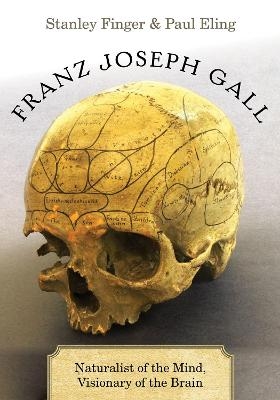
Franz Joseph Gall
Oxford University Press Inc (Verlag)
978-0-19-046462-2 (ISBN)
Rather than looking upon Gall's "organology" as one of science's great mistakes, this book provides a fresh look at the man and his doctrine. The authors delve into his motives, what was known about the brain during the 1790s, and the cultural demands of his time. Gall is rightfully presented as an early-19th-century biologist, anthropologist, philosopher, and physician with an inquisitive mind and a challenging agenda--namely, how to account for species and individual differences in behavior. In this well-researched book, readers learn why, starting as a young physician in Vienna and continuing his life's work in Paris, he chose to study the mind and the brain, why he employed his various methods, why he relied so heavily on cranial features, and why he wrote what he did in his books. Frequently using Gall's own words, they show his impact in various domains, including his approach to the insane and criminals, before concluding with his final illness and more lasting legacy.
Stanley Finger received his PhD from Indiana University and has been on the faculty of Washington University in St. Louis since that time. His is currently Professor Emeritus in the Department of Psychological and Brain Sciences at Washington University, and affiliated with the school's History of Medicine Program. His focus has been on the history of the neurosciences, notably brain and behavior, electric fishes in the history of neurophysiology, Benjamin Franklin's medicine, and how the neurosciences have long been reflected in the arts (e.g., painting, literature, and music). He has served as the editor of the Journal of the History of the Neurosciences for 20 years; was the first President of the International Society for the History of the Neurosciences; and has received many honors, including the latter society's lifetime achievement award in 2016. Paul Eling studied Psychology at the Catholic University Nijmegen (currently: Radboud University), specializing in cognitive psychology and finishing his dissertation, titled 'Studies on laterality: Controversial issues in the approach of hemisphere specialization' in 1983. After working for 2 years as a post-doc on an aphasia project at the Max Planck Institut fur Psycholinguistik in Nijmegen, he returned to the university, becoming an assistant professor at the department of Biopsychology, and later an associate professor, teaching neuropsychology. He was involved in a broad range of research projects, examining primarily cognitive disorders following brain lesions. Apart from publishing scientific papers, he was involved as author and editor of a series of books, including textbooks in the area of neuropsychology and neuropsychiatry and books on topics from the history of the neurosciences. In addition, he has always had a great interest in the history of the neurosciences, has been a member of the International Society of the History of the Neurosciences, acted twice as Chairman of this Society and is currently editor of the Journal of the History of the Neurosciences.
| Erscheinungsdatum | 04.06.2019 |
|---|---|
| Verlagsort | New York |
| Sprache | englisch |
| Maße | 257 x 180 mm |
| Gewicht | 1225 g |
| Themenwelt | Sachbuch/Ratgeber ► Gesundheit / Leben / Psychologie |
| Medizin / Pharmazie ► Medizinische Fachgebiete ► Neurologie | |
| Studium ► Querschnittsbereiche ► Geschichte / Ethik der Medizin | |
| Naturwissenschaften ► Biologie ► Humanbiologie | |
| Naturwissenschaften ► Biologie ► Zoologie | |
| ISBN-10 | 0-19-046462-3 / 0190464623 |
| ISBN-13 | 978-0-19-046462-2 / 9780190464622 |
| Zustand | Neuware |
| Informationen gemäß Produktsicherheitsverordnung (GPSR) | |
| Haben Sie eine Frage zum Produkt? |
aus dem Bereich


